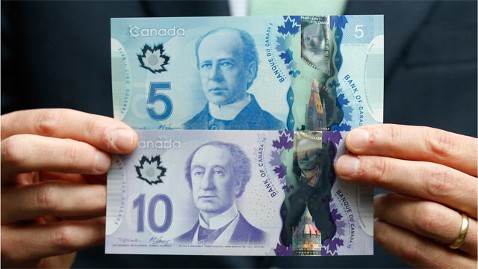New Canadian Money Smells Like Syrup, Melts in Heat

By GEETIKA RUDRA
For some Canadians the sweet smell of money has an aroma exactly like its famed maple syrup.
The introduction of new polymer based bills began in November 2011, but last month more common $5s and $20s have entered circulation. With it has come a flurry of unsettling observations ranging from their supposed aroma to complaints that the bills become sticky and even melt in the heat.
The biggest debate, however, is whether they smell like a good breakfast.
"It's pretty cool actually," says Michael Landsman, 19, of Montreal. "They smell exactly like Canadian maple syrup."
Landsman read about the phenomena in his newspaper and decided to test a $100 note with his family. Without being scratched or heated, the bill gave off a scent that smelled like maple syrup, he said. He had his friends do the sniff test as well.
"A majority of the people I know smell maple syrup when they smell the bills," said Landsman.
Not everybody smells the sugary sweet scent. Popular news sites like Yahoo Canada have been inundated with commentators either debunking or defending their currency's alleged sugary odor.
Dale Alexander, a senior consultant in the Bank of Canada's communications department, denied there is a secret recipe to the bank notes, telling ABC News only, "The bank has not added any scent to the new bank notes."
The debate has spread to voice other concerns about Canada's new currency. They can be sticky and hard to separate, they do not adequately capture Canada's diversity, and they melt when they get hot.
Mona Billard of Ontario discovered the sticky problem earlier this year when she found her son's eight $100 bills melted in a metal can by the radiator. After being turned away from local banks, she took the bills to the Bank of Canada's central office where they were replaced.
Dr. Marilyn Jones-Gotman, a professor in McGill University's Department of Neurology and Neurosurgery, studies olfactory perception. She told ABC News that while it is unusual to happen on such a large scale, it is possible for people to smell a smell that isn't actually there. These olfactory illusions are usually triggered by emotional stimuli.
Dr. Jones-Gotman thinks it's unlikely but she does admit to the strong emotional relationship Canadians have with their maple syrup.